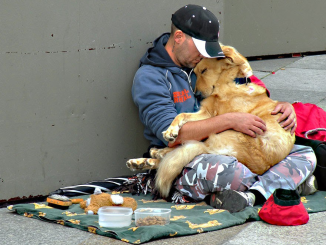Results indicated that not only can dogs detect Covid faster, but they can also do so in a non-intrusive manner – so no need to swab your throat or nose

Dogs can detect Covid-19 faster and more accurately than a PCR test, a new study shows.
Researchers looked at the ability of canines to recognise the virus and its variants, even when they are obscured by other viruses, like those from common colds and flu.
More than 400 scientists from over 30 countries contributed to the study as well as 147 scent dogs, according to the findings published in the Journal of Osteopathic Medicine.
After analysing many studies covering both field and clinical experiments, Professor Dickey and Junqueira found that dogs who are trained to sniff out scents are “as effective and often more effective” than antigen tests.
A total of 53 dogs were trained to sniff out Covid scents, while 37 were not and scientists found that the dogs that were not trained were in some cases “slightly superior” to those that were pre-trained.
“The previously untrained dogs have the advantage that they are not as prone to indicating on scents other than the Covid–19 associated scent,” the paper said.
The results indicated that not only can dogs detect Covid faster, but they can also do so in a non-intrusive manner. This means you won’t need to put a swab in your throat or nose.
How can dogs detect the virus?
This essentially comes down to the dog’s highly evolved nose with its ability to sense out smells quicker.
Dogs possess up to 300 million olfactory receptors in their noses, compared to about six million in humans. And the part of a dog’s brain that is devoted to analysing smells is about “40 times greater” than humans. Canines also have ‘neophilia’, which means they are attracted to new and interesting odours
And so, with all these enhancements, dogs can detect very low concentrations of odours associated with Covid infections.
“They can detect the equivalent of one drop of an odorous substance in 10.5 Olympic-sized swimming pools,” Professor Dickey said. “For perspective, this is about three orders of magnitude better than with scientific instrumentation.”
Scientists also found that in some cases, the animals were also able to detect the virus in pre-symptomatic and asymptomatic patients, “whose viral load was too low for conventional tests to work.”
Professor Dickey has said that dogs can also differentiate Covid and its different variants in the presence of other respiratory viruses. This included the common cold or flu.
“They’re much more effective. In fact, one of the authors that we quote in the paper commented that the RT-PCR test is not the gold standard anymore. It’s the dog. And they’re so quick,” he added. “They can give you the yes or no within seconds if they’re directly smelling you.”

How was the study conducted to see if dogs can really detect Covid-19?
In some studies, the dogs gave a person a quick sniff, sitting down to see if the person has Covid. In another study, the dog was given a sweat sample to smell for a few minutes.
The press release has said that scent dogs, such as beagles, basset hounds and coonhounds are the ideal candidates for sniffing out the virus, given their “natural tendencies to rely on odours to relate to the world.”
But the studies which the researchers analysed showed a variety of dogs were up for the challenge and were able to sniff out the Covid odour. With a few weeks of training, puppies, older dogs, purebred and mixed breeds, both male and female were able to sniff such odours out and “all performed admirably,” the Eureka Alert press release said.
Although there has been success with dogs detecting such viruses, researchers believe there are still many challenges with using dogs for medical diagnoses.
“There’s quite a bit of research, but it’s still considered by many as a kind of a curiosity,” said Professor Dickey.
In conclusion, Professor Dickey and Junqueira said after reviewing the studies, believe that scent dogs deserve “their place as a serious diagnostic methodology that could be particularly useful during future pandemics, potentially as part of rapid routine health screenings in public spaces.”
“Perhaps, most importantly, we argue that the impressive international quality and quantity of COVID scent dog research described in our paper for the first time, demonstrates that medical scent dogs are finally ready for a host of mainstream medical applications,” they added.
A Heartwarming Reunion: Owner and Loyal Dog Embrace After Three-Year Separation at Shelter, Spreading Joy Worldwide
At a nearby shelter, an affectionate dog and their devoted human finally reunited after a long three-year separation. This touching moment touched many hearts and inspired people around the globe with its message of unyielding loyalty and unwavering love.

Once upon a time, a heartwarming tale unfolded when a special bond was broken due to unforeseen circumstances. The owner had to make a difficult decision to part ways with their dear furry friend. As a result, the loyal dog found themselves in a shelter, eagerly waiting for the day when they could be reunited with their human companion.

The day everyone had been waiting for had finally arrived. The loyal canine, who had found temporary refuge in a shelter, was about to be reunited with its owner within the shelter’s walls. As the owner walked in, there was an air of anticipation and emotions ran high. The faithful dog seemed to sense its owner’s familiar scent and immediately burst with excitement and recognition.
The reunion between the two was nothing less than magical. The dog’s tail wagged furiously as it leaped towards its owner, unleashing a flood of pure joy. The owner was overwhelmed with emotion, dropping to their knees as the two hugged each other in tears. Their embrace spoke volumes about the depth of their bond, transcending language barriers and conveying a profound connection that had withstood the test of time and separation.

The news about the heartwarming reunion between a human and their loyal pet spread rapidly, capturing the interest of people worldwide. Social media became a channel for this touching story, with the hashtag #LoyalReunion trending as users shared the touching moment. Numerous messages of love and support flooded in, highlighting that stories that depict the unwavering devotion between humans and their animal companions have a universal impact.

This story highlights the significant role that pets play in our lives and the strong emotional ties that develop between them and their owners. It’s a touching reminder that amidst the chaos and unpredictability of life, the reunion between this devoted dog and its caring owner serves as a symbol of hope and a powerful example of the life-changing effects of love and companionship. It’s a beautiful testament to the positive impact that even small moments of connection can have on our well-being.



Leave a Reply